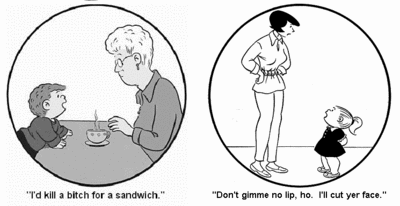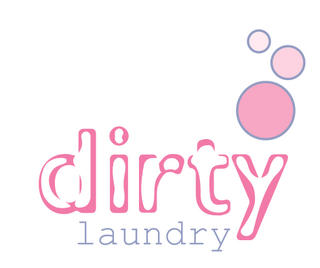it must be every-other-friday, because a new column came out in baltimore gay life this week! for the first time, it carries the moniker "dirty laundry." i'm going to be a dork and put my logo on it. booyah.
 I Like You
I Like Youby Robert
John shifted uncomfortably in his seat and looked over at me. He moved my hand from the gearshift of my car into his own, and all at once, in a single, nervous stream, he said, "Listen, Robert. I really like you."
"I know," I told him. I did know. One of the great things about John, for all of his faults, was that he never failed to tell me how he felt. He could be excitable or accusatory, but he was never stoic. He liked me and he told me so, usually four or five times a day.
"No, I mean really," he said. I slowly exhaled, wondering what was coming next. John went on hurriedly, "I really like you and I was wondering if you wanted to be monogamous. I want you to be my boyfriend, Robert."
I half-smiled, pleased but not surprised. "You're the only person I've wanted to sleep with for a while anyway, babe," I told him. "Of course we can say we're boyfriends."
The truth is that I'm always surprised when people feel like they have to ask. I've been dating boys since I was 17, but I still can't seem to figure out the ins and outs of dating, specifically our self-imposed labelling system. What are the levels, for instance? When does
seeing each other turn into
dating? When does we're
dating become
he's my boyfriend? And why do we have to think about it so much? Does there have to be a moment in a relationship when you get down on one knee and say to the guy you're
seeing or
dating or whatever and say "I want you to be my boyfriend"? Call me old-fashioned, but if we've seen each other every day for the last two months and we've spent more nights together than alone I consider you my boyfriend.
"I guess I'd never thought about it," an ex-boyfriend said to me on the phone last night. I told him that I'd been thinking a lot lately about how it is that people decide what to call each other in a relationship. "When I was dating this guy named Drew we never even brought up the term boyfriend," he said. "Like, it just wasn't ever an option. We were dating, then he started to annoy me, so we decided..."
"We?" I asked.
"Ok, so
I decided that we wouldn't date anymore."
"Ok," I said, "but where was the point in our relationship that we decided to be boyfriends--officially?"
"There wasn't one," he said.
I realized he was right: there wasn't a big talk. There wasn't an epiphany; there weren't furtive glances or sweaty-palmed proposals. It just was. We met, we hung out; we played GameCube and drank Miller Lite and laughed and screwed and sometimes fought. And before I knew it we were celebrating our year anniversary and living together. And we were in love, and it didn't have to be dissected or named. It just was.
Being back on the market, though, has reminded me that apparently there are all these tiers of dating, and they seem to be mutually exclusive: you're either sleeping together, or you're seeing each other, or you're dating, or you're boyfriends, or you're partners. And you have to be damned sure at each stage of the game that one of you isn't speeding ahead of the other.
As I sit here writing this, though, I start to wonder: what's my big problem with labelling a relationship? What's so wrong with really sitting down and deciding where a relationship is headed? That way no one gets hurt, right?
I wonder if I avoid having the boyfriend talk in relationships because I don't really want to know where things are headed. Once I label a relationship, I start to have a hand in where the relationship is going; I've taken control and forged a bond. I'm responsible for the creation of something life-altering, whatever its outcome.
But maybe it's time for me to take the reigns. Maybe I've laid low too long, swum around in ambiguity longer than I should have. Maybe it's time for me to realize that even though naming a relationship makes it vulnerable, it also brings it fully into existence. That people will fight and relationships will fail; that lovers will leave, but that sometimes people will step in to take their place. That naming something's part of the adventure.








